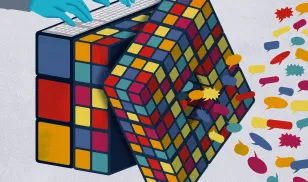


Iran
The Islamic Republic of Iran holds elections regularly, but they fall short of democratic standards due in part to the influence of the hard-line Guardian Council, an unelected body that disqualifies all candidates it deems insufficiently loyal to the clerical establishment. Ultimate power rests in the hands of the country’s supreme leader, Ayatollah Ali Khamenei, and the unelected institutions under his control.
Research & Recommendations
Iran
| PR Political Rights | 4 40 |
| CL Civil Liberties | 7 60 |
Overview
The Islamic Republic of Iran holds elections regularly, but they fall short of democratic standards due in part to the influence of the hard-line Guardian Council, an unelected body that disqualifies all candidates it deems insufficiently loyal to the clerical establishment. Ultimate power rests in the hands of the country’s supreme leader, Ayatollah Ali Khamenei, and the unelected institutions under his control. These institutions, including the security forces and the judiciary, play a major role in the suppression of dissent and other restrictions on civil liberties.
In countries where democratic forces have come to power after periods of antidemocratic rule, the new governments should pursue an agenda that protects and expands freedoms even as it delivers tangible economic and social benefits to citizens.
These countries must act swiftly to release all political prisoners, build or revitalize democratic institutions, reform police and other security forces, organize and hold competitive multiparty elections, and ensure accountability for past human rights violations.
In countries where there has been significant erosion of political rights and civil liberties, policymakers, legislators, jurists, civic activists, and donor communities should work to strengthen institutional guardrails and norms that serve to constrain elected leaders with antidemocratic or illiberal aims.
Iran
| A Obstacles to Access | 8 25 |
| B Limits on Content | 4 35 |
| C Violations of User Rights | 1 40 |
Political Overview
The Islamic Republic of Iran holds elections regularly, but they fall short of democratic standards due in part to the influence of the hard-line Guardian Council, an unelected body that disqualifies all candidates it deems insufficiently loyal to the clerical establishment. Ultimate power rests in the hands of the country’s supreme leader, Ayatollah Ali Khamenei, and the unelected institutions under his control. These institutions, including the security forces and the judiciary, play a major role in the suppression of dissent and other restrictions on civil liberties.
Freedom of expression online has been and is increasingly under attack as governments shut off internet connectivity, block social media platforms, and restrict access to websites that host political, social, and religious speech. Protecting freedom of expression will require strong legal and regulatory safeguards for digital communications.
Governments should encourage a whole-of-society approach to fostering a high-quality, diverse, and trustworthy information space. The Global Declaration on Information Integrity Online identifies best practices for safeguarding the information ecosystem, to which governments should adhere.
Comprehensive data-protection regulations and industry policies on data protection are essential for upholding privacy and combating disproportionate government surveillance, but they require careful crafting to ensure that they do not contribute to internet fragmentation—the siloing of the global internet into nation-based segments—and cannot be used by governments to undermine privacy and other fundamental freedoms.

The Iranian regime’s expansive definition of who constitutes a threat to the Islamic Republic contributes to the breadth and intensity of its transnational repression campaign. The authorities frequently label the targeted dissidents and journalists as terrorists, using the term as a blanket justification for violence and disregard for due process. The campaign incorporates the full spectrum of transnational repression tactics, including assassinations, renditions, detentions, unlawful deportations, Interpol abuse, digital intimidation, spyware, coercion by proxy, and mobility controls. These tools have been deployed against Iranians in at least nine countries in Europe, the Middle East, and North America.
Like-minded governments and international organizations should work together to highlight the threat of transnational repression and establish international norms for addressing it.
This includes agreeing on a common definition of transnational repression, and prohibiting the use of Interpol notices on their own to deny immigration or asylum benefits or conduct arrests.
Among other tactics, governments should deploy a robust strategy for targeted sanctions against perpetrators of transnational repression.




